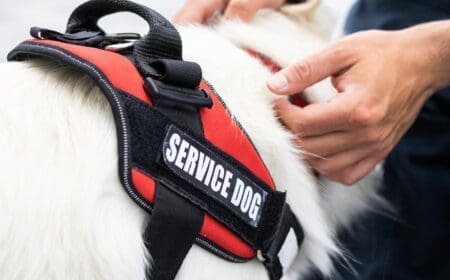Only people that have an emotional support animal (ESA) can understand how important it is for their animal to accompany them everywhere they go. Unfortunately, there are often laws in place that restrict animals from entering certain places.
That said, if you’re a resident of Nevada and need more information about the rights of your ESA within the state, you’ll find everything you need in this article. We’ll look at Nevada’s emotional support animal laws, what defines an ESA, how you can make sure that your ESA letter isn’t rejected by landlords, and more.
Defining an ESA in Nevada
Sometimes, when life’s throwing lemons at you, you just need a fuzzy friend to help you through it, and that’s where an ESA comes in – your emotional sidekick from the animal kingdom. An emotional support animal is not an average pet; it’s a certified superhero of the heart as they provide emotional comfort and support to anyone dealing with mental health challenges. Think of them as your four-legged therapist, minus the clipboard and leather couch.
The best thing about ESAs is that they aren’t restricted to specific species. They could be a dog, cat, rabbit, or even a miniature horse if that’s what calms you down! The key is their ability to make you feel better, not the species on their birth certificate.
Getting an ESA isn’t as simple as putting a cape on your hamster’s back, though. It involves a process. First, you need to be diagnosed with a mental health disorder by a licensed mental health professional. Once you’ve got that sorted, your therapist or mental health professional can prescribe an ESA as part of your treatment plan.
The great thing is, unlike service animals who require rigorous training to perform specific tasks, ESAs don’t need to learn complex tricks. Their superpower lies in simply being there for you, offering unconditional love, and turning those frowns upside down.
How Are ESAs in Nevada Different From Service Animals?
Service animals are trained to perform specific tasks that assist people with disabilities. These could be guide dogs for the visually impaired, hearing dogs for those with hearing loss, and mobility assistance dogs for people with mobility challenges. These animals work hard to make life more manageable for their human companions.
Emotional support animals aren’t taskmasters; they’re more akin to emotional cheerleaders. Their superpower is providing comfort and companionship to folks dealing with mental health challenges.
Here’s the key difference to remember: service animals have specific training to perform tasks directly related to a person’s disability, while ESAs focus on the emotional well-being of their human pals. You won’t catch an ESA guiding you through a busy intersection or alerting you to a ringing phone. Instead, they excel at the subtle art of making you feel warm and fuzzy inside.
When it comes to legal rights, there’s also a distinct difference – service animals get the VIP treatment. They can go almost anywhere their human goes – restaurants, malls, you name it. ESAs, on the other hand, have limited access rights.
Your ESA can be perfectly fine within the confines of an apartment complex, but they might not get a reservation at the fanciest restaurant in town.
Nevada Laws on ESAs
Nevada delineates laws regarding emotional support animals in accordance with the overarching guidelines from the Fair Housing Act (FHA), Americans with Disabilities Act (ADA), Air Carrier Access Act (ACAA), and more. There’s a lot of nuances to understand regarding these laws, so let’s get into it with the FHA first:
Fair Housing Act (FHA)
In terms of Nevada’s ESA housing laws, landlords can’t play sneaky games when it comes to extra charges or deposits for your fuzzy roommates. The FHA ensures that landlords stick to the script, which means they can ask for the standard security deposit, but charging extra for the privilege of having an ESA? Not on the FHA’s watch.


These laws align with the Americans with Disabilities Act (more on that later), which brings out its big guns to ensure reasonable accommodations for individuals with ESAs. So, what does this mean for you and your four-legged confidante in Nevada?
First off, if you find yourself in a “no-pet” building or housing complex, you can cite the FHA laws that allow ESAs to walk through your apartment door that might have otherwise stayed shut. Pet restrictions and breed bans can also be considered waived.
Essentially, all of Nevada’s ESA housing laws are in sync with the federal requirement, so what’s good for the federal government is certainly good enough for housing in Nevada.
The only thing to consider is that landlords, in their role as gatekeepers to housing, can ask for documentation to back up the disability and the need for the ESA. Fair’s fair, right? However, they can’t go all-out detective mode; the information requested must be reasonable, not a deep dive into your psyche.
The ESA letter can also be denied by landlords under certain conditions, which are discussed in more detail later on. For now, it’s important to note that the denial of an ESA letter happens only under particular conditions – landlords cannot make an arbitrary decision to do so.
Americans with Disabilities Act (ADA)
The Americans with Disabilities Act (ADA) primarily addresses the rights of individuals with disabilities and their access to public places. However, it’s important to note that the ADA does not directly apply to emotional support animals. Instead, the ADA focuses on service animals, which are animals trained to perform specific tasks for individuals with disabilities.
Service animals, under the ADA, are defined as dogs (and in some cases, miniature horses) that are individually trained to do work or perform tasks for a person with a disability. These tasks can include guiding individuals who are blind, alerting individuals who are deaf, pulling a wheelchair, or providing other assistance with physical disabilities.
Unlike service animals, ESAs are not trained to perform specific tasks related to a disability. Their primary function is to provide emotional support and companionship to individuals with mental health conditions.
Air Carrier Access Act (ACAA)
Initially, the ACAA allowed ESAs to accompany their owners on planes. However, since 2021, this law has changed – ESAs no longer hold membership in the “assistance animal” club under the ACAA. The VIP treatment is a thing of the past, along with the automatic access rights they once enjoyed.
According to the new changes, airlines now have more say in setting policies for ESAs. This includes requiring additional documentation beyond a simple letter from a mental health professional, introducing size and weight restrictions, charging pet fees akin to regular pets, and even having the authority to deny boarding for ESAs exhibiting disruptive behavior or posing a safety risk.
How You Can Get an ESA Letter in Nevada
Here are the steps involved in getting an ESA letter in Nevada:
Step 1: Consultation With a Mental Health Professional
Begin by having a conversation with a licensed mental health professional. This could be a caring psychiatrist, a psychologist, or a friendly therapist – someone who truly understands the importance of mental well-being.
Step 2: Discuss Your Need for an ESA
Open up about your feelings and experiences during this consultation. Let your mental health professional know how having an ESA could bring joy and comfort to your life. It’s extremely important for you to be genuine and open to the professional so they can evaluate your need for an ESA and prescribe a letter accordingly.
Step 3: Evaluation and Diagnosis
Your mental health professional, like a trusted guide, will assess your situation with care. They’ll explore whether having an ESA aligns with your treatment plan, considering the positive impact a furry companion might have on your emotional wellness.
Step 4: Request an ESA Letter
Once you’ve had your consultation and the professional sees the potential benefits of an ESA in your life, it’s time to request that special letter. Picture it as a handwritten note that affirms your mental health condition, expresses the therapeutic benefits of having an ESA, and includes the professional’s credentials.
Step 5: Be Prepared for Follow-Up Questions
Your mental health professional might ask a few more questions or seek clarification. Stay open and remember, it’s all about ensuring that the letter truly reflects your unique situation.
Step 6: Understand and Abide by Regulations
Understand that there are specific rules regarding ESA letters. Airlines and landlords may have their own guidelines, so familiarize yourself with these to ensure a smooth experience.
Can My ESA Letter Be Denied by a Landlord?
ESA letters should be valid and undeniable in most cases, thanks to the Fair Housing Act (FHA). However, there are a few scenarios where your ESA letter could potentially be rejected:
- Sketchy Documentation: If your landlord suspects your ESA letter is fishy or not from a legit mental health professional, they might be inclined to deny it. Make sure your letter is the real deal and obtained from a licensed professional.
- Safety Concerns: If your ESA is a safety hazard to the point where their presence is threatening other tenants or wrecking the place, your landlord could deny your ESA
- Too Many or Too Big Animals: If you’re rolling in with a zoo or your animals are taking over, your landlord might say no. It’s important to keep it reasonable, size-wise and number-wise.
Remember, your landlord can’t just say no because of a no-pet policy or personal preferences. The FHA makes sure to account for reasonable accommodations for people with disabilities, including those with ESAs.
Taking Care of an ESA in Nevada
Once you have an ESA, the next crucial step is taking care of them. As much as emotional support animals are there to improve your mental health, they’re still entirely reliant on you for their care as well – it’s a relationship of give and take. With that in mind, here are some tips regarding taking care of your ESA in Nevada:
Creating a Comfortable Home: Your home is your sanctuary, and the same goes for your ESA. Ensure they have a cozy spot, perhaps a soft bed or a favorite blanket, where they can retreat and feel secure. Keep their living space clean and safe, free from hazards that might cause stress or discomfort.
Prioritize Mental and Physical Exercise: Just like humans, ESAs benefit from both mental and physical stimulation. Nevada’s scenic landscapes offer an excellent backdrop for leisurely strolls or energetic play. Regular exercise not only keeps them physically healthy but also contributes to their emotional well-being.
Nutrition Matters: Provide them with a balanced and nutritious diet suitable for their age, size, and health condition. Regular vet check-ups can ensure their dietary needs are met, contributing to their overall health.
Routine Vet Care: A healthy ESA is a happy ESA. Regular veterinary check-ups, vaccinations, and preventive care are essential. Nevada has a range of veterinary services, ensuring your ESA receives the best healthcare to thrive.
Socialization Opportunities: Nevada’s warm and welcoming community provides numerous opportunities for socialization. Whether it’s local pet-friendly events or friendly encounters in parks, exposing your ESA to positive social experiences can contribute to their emotional well-being.
Respect for Others: While your ESA brings immense joy, it’s essential to be mindful of others. Ensure your ESA is well-behaved in public spaces, respecting the comfort and safety of those around you. Being a considerate ESA owner reflects positively on the entire community.
FAQs About ESAs in Nevada
Will My Pet Mouse Be Rejected if I Have an ESA Letter for It?
The short answer is no. Having an ESA letter for your pet mouse significantly improves your chances of accommodation. Landlords are generally required to consider reasonable accommodations for ESAs under the Fair Housing Act – ensure the letter is legitimate, highlighting your mouse’s role in providing emotional support.
While the mouse certainly won’t breach any size restrictions, potential damage concerns and individual landlord policies might still be factors to consider. Always communicate openly with your landlord to address any concerns they may have.
Is It Difficult to Get an ESA Letter in Nevada?
Getting an emotional support animal (ESA) letter isn’t inherently difficult. In fact, the process is pretty straightforward – consult a licensed mental health professional, discuss your need for an ESA, and, if appropriate, request a letter. The challenge may vary, but the process is generally quite simple if you have a genuine need and the support of a qualified professional.
Can I Take My ESA on a Plane With Me in Nevada?
The answer to this one is a bit tricky – some airlines allow you to bring an ESA with you as long as they meet certain criteria. For instance, JetBlue lets you bring your pet with you in an approved pet carrier and the weight of the animal does not exceed 20 pounds. However, this varies from airline to airline, so it’s best to check with your specific airline.
Navigating ESA Laws in Nevada
Laws regarding ESAs can often feel like a gray area in the legal landscape – they’re not treated the same as service animals, but they’re also not treated the same as a regular pet. With the guidelines discussed in this article, you should now be more aware of your rights as the owner of an ESA letter and the privileges it provides your furry companion.
Moreover, as witnessed by the change in the ACAA following 2021, it’s extremely important that you stay up to date with official publications from the federal government, as well as the State of Nevada, and remain cognizant of new laws regarding your ESA.




